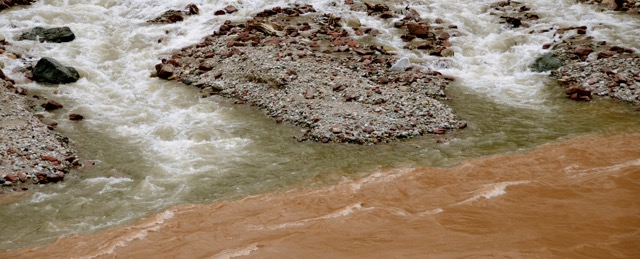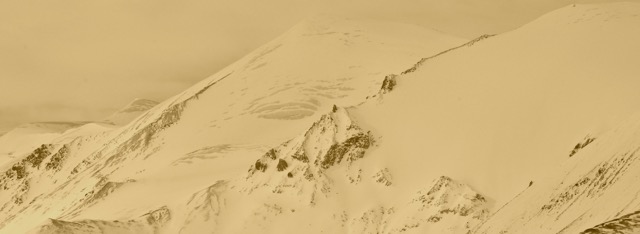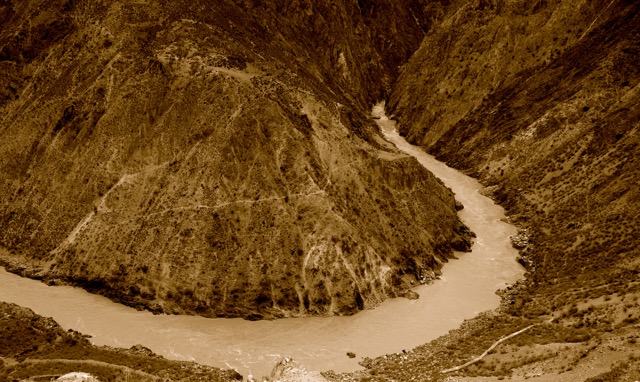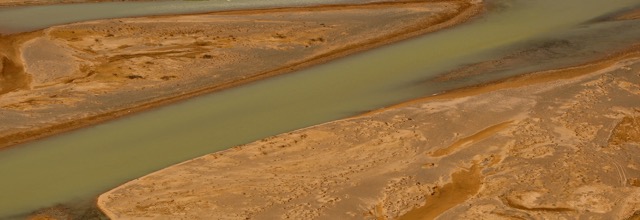
Returning to northwestern Yunnan’s snow-clad mountains and their precious waterways. We’ll wander up the Salween River (pronounced Gyalmo Gyul Chu and written རྒྱལ་མོ་རྔུལ་ཆུ། in Tibetan) to the eastern extension of the Himalayas and a slow route south along portions of both the Mekong (pronounced Dza Chu in Tibetan and written རྫ་ཆུ) and Yangtze (Ma Chu at the source and written རྨ་ཆུ) Rivers.

All of these waterways find their way off of the Tibetan Plateau and collectively they chart almost 20,000 km’s striating and convening as they journey to distant seas. Long coveted by the people within the mountains as living beings, the waterways are fast becoming the most coveted items to many beyond the ‘hills’.

Tortured and utterly precious, the rivers are the arteries of the mountains, fed by glaciers and deep springs. Journeys that begin as begin as numbingly cold and clean descend to become barely recognizable. For centuries the rivers acted as not simply sources but as guides for the traders, pilgrims, and wildlife of the mountains.

Winter’s snows are still atop the mountains that hang and feed the rivers – a perfect time to be there.

As the nomadic Yi often say of the rivers, “As long as the water makes a sound, all is well”.

About JeffFuchs
Bio
Having lived for most of the past decade in Asia, Fuchs’ work has centered on indigenous mountain cultures, oral histories with an obsessive interest in tea. His photos and stories have appeared on three continents in award-winning publications Kyoto Journal, TRVL, and Outpost Magazine, as well as The Spanish Expedition Society, The Earth, Silkroad Foundation, The China Post Newspaper, The Toronto Star, The South China Morning Post and Traveler amongst others. Various pieces of his work are part of private collections in Europe, North America and Asia and he serves as the Asian Editor at Large for Canada’s award-winning Outpost magazine.
Fuchs is the Wild China Explorer of the Year for 2011 for sustainable exploration of the Himalayan Trade Routes. He recently completed a month long expedition a previously undocumented ancient nomadic salt route at 4,000 metres becoming the first westerner to travel the Tsa’lam ‘salt road’ through Qinghai.
Fuchs has written on indigenous perspectives for UNESCO, and has having consulted for National Geographic. Fuchs is a member of the fabled Explorers Club, which supports sustainable exploration and research.
Jeff has worked with schools and universities, giving talks on both the importance of oral traditions, tea and mountain cultures. He has spoken to the prestigious Spanish Geographic Society in Madrid on culture and trade through the Himalayas and his sold out talk at the Museum of Nature in Canada focused on the enduring importance of oral narratives and the Himalayan trade routes.
His recently released book ‘The Ancient Tea Horse Road’ (Penguin-Viking Publishers) details his 8-month groundbreaking journey traveling and chronicling one of the world’s great trade routes, The Tea Horse Road. Fuchs is the first westerner to have completed the entire route stretching almost six thousand kilometers through the Himalayas a dozen cultures.
He makes his home in ‘Shangrila’, northwestern Yunnan upon the eastern extension of the Himalayan range where tea and mountains abound; and where he leads expeditions the award winning ‘Tea Horse Road Journey’ with Wild China along portions of the Ancient Tea Horse Road.
To keep fueled up for life Fuchs co-founded JalamTeas which keeps him deep in the green while high in the hills.





